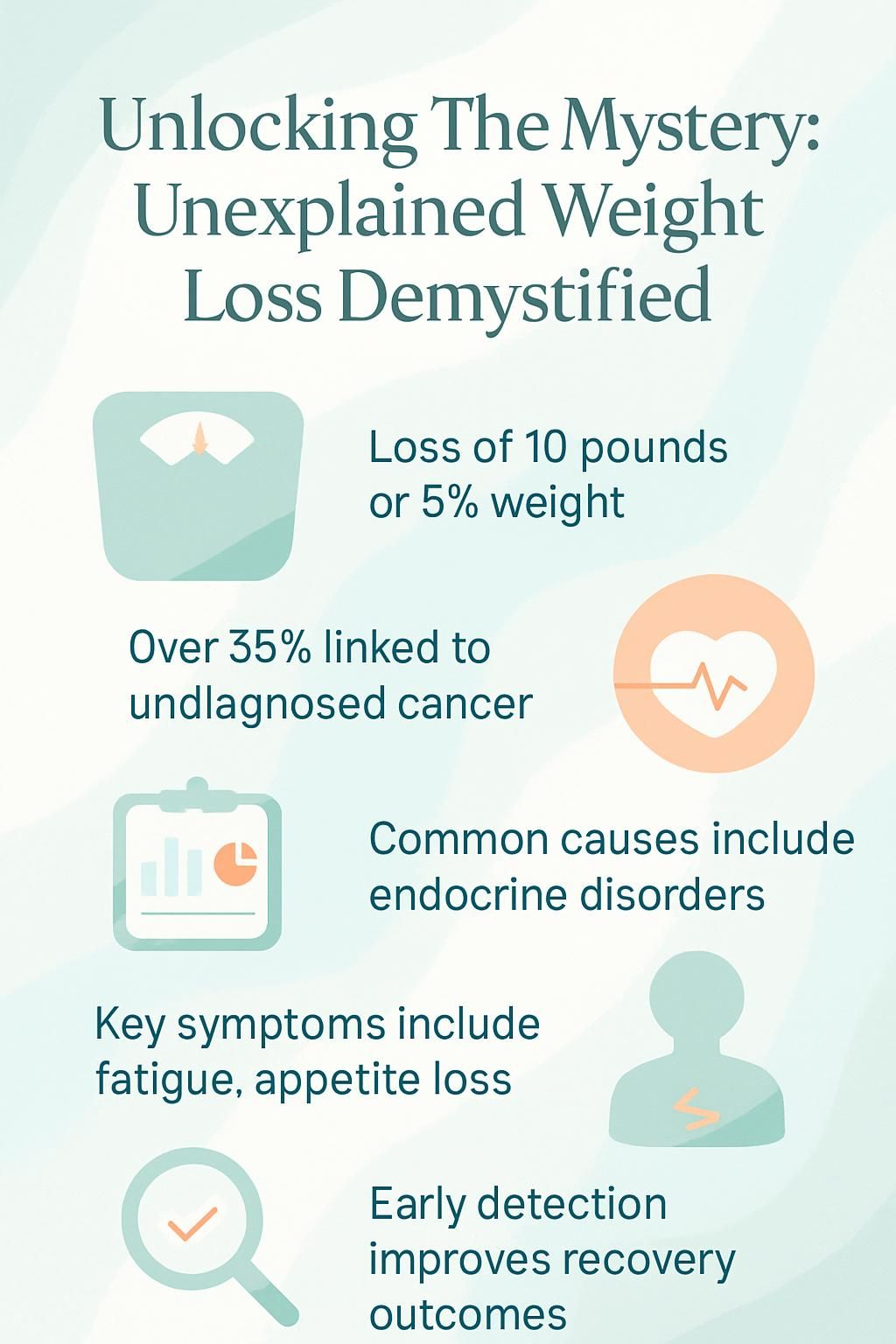Unlocking The Mystery: Unexplained Weight Loss Demystified
Our Nutrition Assistant AI Suite will transform your body. You will lose fat, get toned, and build muscle. Gain confidence and optimal health.
If you are losing weight without trying, it can feel unsettling. Unexplained weight loss means losing at least 10 pounds, or 5 percent of your body weight, within six to twelve months with no change in diet or exercise. It can be the first sign of a medical condition, including cancer, diabetes, or thyroid disease. Early attention helps you find the cause and start the right care.
This guide explains what counts as unexplained weight loss, the possible causes, the symptoms to watch, how doctors test for it, and which treatments help. Learn what to track and when to call your physician.
Key Takeaways
- Unexplained weight loss means an unintentional drop of 10 pounds or 5% of body weight within six to twelve months. Doctors view it as a warning sign for hidden illness (Mayo Clinic, Merck Manual).
- People who report this symptom are far more likely to receive a new cancer diagnosis, with some primary care studies showing up to a 12-fold increase in risk for certain cancers.
- Common causes include endocrine problems like hyperthyroidism, autoimmune diseases such as rheumatoid arthritis, digestive illnesses including Crohn’s disease and ulcerative colitis, mental health conditions, and infection.
- Urgent warning symptoms include persistent fatigue, soaking night sweats, fever above 100.4°F for more than two weeks, chronic diarrhea or vomiting, and loss of appetite.
- Diagnosis often uses a medical history and exam, blood tests, and imaging. Treating the underlying cause, improving nutrition, and addressing mood or muscle loss can support recovery.

What is Unexplained Weight Loss?

Unexplained weight loss is a drop in body weight that happens without effort. Doctors use a simple rule: more than 10 pounds, or at least 5 percent of your usual weight, within six to twelve months without trying to lose.
Small daily shifts, like two or three pounds, often come from water changes or hormones and are not a concern. A larger, continued drop suggests a medical issue and deserves a checkup. Mayo Clinic experts advise contacting your healthcare provider early for evaluation.
A close relative of mine lost weight quickly. Testing showed an overactive thyroid, a treatable cause. That experience taught me that guessing delays care, while a visit to your clinician speeds answers.
Common Causes of Unexplained Weight Loss
Unexplained weight loss may signal a health condition that affects appetite, digestion, or how your body uses energy. Finding the cause guides treatment.
Which medical conditions cause unexplained weight loss?
Many conditions can lead to weight changes you did not plan. These problems either lower intake, block absorption, or raise calorie use.
- Addison’s disease reduces adrenal hormones, cortisol and aldosterone. Symptoms include chronic diarrhea, nausea, vomiting, and low appetite.
- Crohn’s disease and ulcerative colitis damage the gastrointestinal tract. Diarrhea and poor absorption often lead to weight loss.
- Celiac disease makes the body react to gluten. The gut cannot absorb nutrients well, causing diarrhea, anemia, and weight loss.
- Cancer, including lung, pancreatic, esophageal, liver cancers, lymphomas, and others, can trigger cachexia, a muscle-wasting syndrome, even with normal calories.
- Advanced HIV infection can alter metabolism and cause severe diarrhea and weight loss.
- Diabetes, especially undiagnosed or poorly controlled, forces the body to burn fat and muscle for energy when glucose is not used well.
- Depression and anxiety can cut appetite or disrupt eating routines, leading to unintentional weight loss.
- Dementia can cause forgetting meals, swallowing trouble, dental problems, and low appetite.
Digestive disorders are common drivers, so it helps to understand how they affect weight.
How do digestive disorders like Crohn’s disease and ulcerative colitis affect weight?
Inflammatory bowel disease keeps the gut inflamed. In Crohn’s disease and ulcerative colitis, diarrhea, cramping, and poor appetite reduce intake. The injured intestine also absorbs fewer nutrients, so your body gets less fuel.
Frequent bowel movements and pain can make regular meals hard. Studies report many people with active Crohn’s lose more than 5 percent of their weight within six months. If you have ongoing digestive symptoms with weight loss, ask your clinician for testing and treatment.
Can mental health conditions such as depression or anxiety lead to weight loss?
Yes. Major depressive disorder, anxiety, and related conditions can lower hunger, change sleep, and disrupt routines. That mix often leads to unintentional weight loss.
Eating disorders, such as anorexia nervosa and bulimia, also cause significant weight changes. Neurologic illnesses like Parkinson’s may combine mood symptoms with low appetite, which increases risk.
What endocrine disorders contribute to unexplained weight loss?
Hormone problems often change metabolism. Hyperthyroidism speeds calorie burning and can cause weight loss, a rapid heartbeat, sweating, and poor sleep. Addison’s disease lowers cortisol and aldosterone, which can reduce appetite and energy.
Type 1 diabetes may cause the body to burn fat and muscle when it cannot use glucose well. Electrolyte problems, such as high calcium, can also worsen weight loss. Finding and treating these issues early helps weight stabilize.
How does cancer cause unexplained weight loss?
Cancer can change how your body uses energy. Tumors release chemicals that raise metabolism. Some cancers also reduce appetite or cause early fullness, especially with stomach, liver, or pancreatic involvement. Treatment can affect taste and smell, which makes eating harder.
In primary care studies, unexpected weight loss increased the chance of a new cancer diagnosis. Some reports suggest it is present in about 40 percent of new cancer cases at the time of diagnosis. Lung, liver, pancreatic, esophageal cancers, and lymphomas are often linked with early weight loss.
What infections are linked to unexplained weight loss?
Several infections can lead to weight loss. Advanced HIV infection changes metabolism and causes chronic diarrhea. Tuberculosis is well known for weight loss even when intake seems adequate.
Parasitic infections, such as giardiasis, cause diarrhea, cramps, and poor absorption. Helicobacter pylori can inflame the stomach lining and lead to ulcers and weight loss over time. If digestive symptoms persist with weight loss, your clinician may order stool tests or breath tests to look for these infections.
How do autoimmune disorders like rheumatoid arthritis affect weight?
Autoimmune diseases keep the immune system active. Rheumatoid arthritis, Crohn’s disease, and similar conditions release cytokines, chemicals that can break down muscle and raise energy needs. Pain and stiffness can also reduce appetite.
Some autoimmune diseases injure organs that handle digestion and filtration, such as the gut or kidneys. That damage can worsen nutrient losses and speed weight changes. Ongoing weight loss in this setting needs medical evaluation.
Other Possible Risk Factors
Beyond medical diagnoses, other factors can push weight down. Medicines, low nutrient intake, and chronic inflammation are frequent drivers.
How can medications and their side effects cause weight loss?
Medicines can lower appetite, change taste or smell, dry the mouth, or cause nausea. Those effects make eating less appealing. Some cancer drugs do this often. Misuse of prescription stimulants can also cut appetite and trigger weight loss.
Drugs that irritate the gut may reduce nutrient absorption. A loss of about 10 pounds, or 4.5 kilograms, over six months without trying is clinically important. Tell your doctor about every prescription, over-the-counter medicine, and supplement you use.
What role do nutritional deficiencies play in unexplained weight loss?
If your body lacks key nutrients, weight often falls. Celiac disease and Crohn’s disease can block the absorption of vitamins and minerals. Dental pain can limit what you eat, so you miss calories and protein.
Low protein, iron, vitamin B12, folate, or vitamin D can cause fatigue and weakness that further lower intake. Correcting the deficiency helps energy return and supports healthy weight.
How does chronic inflammation contribute to weight loss?
Chronic inflammation raises energy use even while resting. Conditions such as rheumatoid arthritis, chronic pancreatitis, heart failure, and ulcerative colitis often break down muscle over time.
If you have an inflammatory illness and notice steady weight loss within 6 to 12 months, ask for care. Treatment that lowers inflammation can slow muscle loss and support recovery.
Symptoms to Watch For
Weight loss rarely travels alone. Certain symptoms help point to the cause and tell you when to seek care.
What symptoms accompany unexplained weight loss?
Common symptoms include:
- Fatigue, feeling worn out even after rest.
- Loss of appetite, skipping meals or feeling full quickly.
- Nausea or vomiting, seen with ulcers or pancreatitis.
- Chronic diarrhea, common in Crohn’s disease, ulcerative colitis, celiac disease, or irritable bowel syndrome.
- Night sweats, which can point to infection or cancer.
- Persistent fever, sometimes linked to infections or cancers such as colorectal cancer.
- Dental problems or trouble swallowing that make eating hard.
- New bowel changes, including constipation, diarrhea, blood in stool, or black stools.
- Visible muscle loss, often tied to inflammation or endocrine disease.
- Chronic tiredness with poor daily functioning.
These clues help your clinician build a clear picture and plan the right tests.
Why is fatigue a sign to watch for?
Persistent fatigue can point to infection, endocrine disease, anemia, or cancer. It often shows up with weight loss and signals that your body is working harder than usual.
Fatigue also hurts daily life. Simple chores may feel heavy. If tiredness continues and weight is falling, contact your healthcare provider for an evaluation.
How does loss of appetite relate to weight loss?
Low appetite reduces calorie intake. Over time, that gap causes weight loss even if your activity level stays the same.
Many conditions lower appetite, including Addison’s disease, pancreatitis, peptic ulcers, dementia, depression, and some medicines. Tracking how much you eat helps your clinician see trends faster.
What changes in bowel habits should raise concern?
New or chronic diarrhea, black or bloody stools, and long-lasting constipation deserve attention. These changes can point to inflammatory bowel disease, celiac disease, infection, or bleeding in the gut.
Pairing bowel changes with weight loss increases the chance of a significant diagnosis. Report these symptoms promptly.
Why are night sweats important symptoms?
Night sweats, especially ones that soak sheets, can be a sign of infection or cancer such as lymphoma. When night sweats occur with unexplained weight loss, clinicians consider this a red flag.
Sharing this combination with your doctor helps trigger faster testing and earlier treatment, which often improves outcomes.
When is persistent fever a warning sign?
A temperature above 100.4°F, or 38°C, that lasts more than two weeks needs evaluation, especially if weight is also dropping. Fever with weight loss raises concern for infections, inflammatory disease, or cancer.
Calling your clinician early can prevent complications and speed diagnosis.
Diagnosing Unexplained Weight Loss
Diagnosis starts with your story and a focused exam. Lab work and imaging then narrow the cause so treatment can begin.
How is medical history and lifestyle reviewed during diagnosis?
Your clinician will ask about past conditions, surgeries, family history, and all medicines or supplements. They will review chronic issues such as diabetes or thyroid disease, and discuss tobacco, alcohol, and other substances.
You will likely talk about appetite, sleep, stress, bowel patterns, and access to food. Social factors, like budget or dental care, can affect intake. Honest answers help your provider target the right tests.
What happens during physical examinations for weight loss?
Expect checks of weight, height, pulse, and blood pressure. The exam looks for signs of malnutrition, such as hair thinning or dry skin. Your clinician will examine your mouth and teeth, listen to your heart and lungs, and check your abdomen for tenderness or enlarged organs.
They may test muscle strength and reflexes, and look for rashes or swollen joints. Share all symptoms and any side effects from medicines so nothing is missed.
Which blood tests are used to diagnose causes of weight loss?
Common blood tests include:
- Complete Blood Count, finds anemia or infection.
- Thyroid tests, TSH, T3, T4, detect hyperthyroidism or other thyroid issues.
- Basic Metabolic Panel, checks electrolytes such as sodium, potassium, and calcium.
- Blood glucose and A1C, screen for diabetes or prediabetes.
- Liver function tests, assess digestion and nutrient processing.
- C-reactive protein and ESR, show inflammation from autoimmune disease or infection.
- HIV testing, looks for an infectious cause.
- Albumin and total protein, evaluate nutrition and absorption.
Results guide next steps, such as imaging or referral to a specialist.
How do imaging tests like X-rays, CT scans, and MRIs help?
Imaging checks for structural causes and hidden disease. X-rays, CT scans, and MRIs can find tumors, organ changes, infections, or blockages that explain weight loss.
These scans also help plan treatment by showing where disease is active and how severe it is.
Treatment Options for Unexplained Weight Loss
Treatment focuses on the cause and on restoring strength. Care often blends medical therapy, nutrition support, and activity that rebuilds muscle.
How is treating underlying medical conditions important?
Targeted care reverses weight loss at the source. Diabetes control stabilizes blood sugar and prevents muscle breakdown. Cancer treatment, such as surgery or chemotherapy, can slow or stop further loss. Peptic ulcers may need antibiotics and acid control. Celiac disease improves on a gluten-free diet.
Fixing dental pain, reflux, or swallowing problems can make eating easier. People who treat the root cause tend to regain weight sooner and feel better faster.
What medications are used to address unexplained weight loss?
Medicines are chosen based on the diagnosis. Examples include antibiotics for infection, thyroid drugs for hyperthyroidism, and anti-nausea medicines if vomiting limits intake. Some patients benefit from appetite stimulants.
| Purpose | Example Medications |
|---|---|
| Infection | Antibiotics as indicated |
| Thyroid imbalance | Levothyroxine or antithyroid drugs, based on condition |
| Appetite support | Megestrol acetate, dronabinol |
| Nausea and vomiting | Ondansetron |
Medication plans are individualized. Ask about benefits, side effects, and how the drug supports your nutrition goals.
How can dietary modifications help?
Nutrition therapy fills calorie and protein gaps. Your clinician may suggest small, frequent meals that are energy dense. If you have celiac disease, a strict gluten-free plan protects the gut so it absorbs nutrients again.
Oral nutrition supplements can help when regular meals fall short. In severe cases, tube feeding brings nutrients directly to the stomach or small intestine until eating improves.
When is physical therapy recommended for muscle loss?
Physical therapy helps when muscle loss or weakness limits daily life. A therapist guides safe exercises to rebuild strength, balance, and endurance.
Many people notice progress within weeks. Even short sessions can cut fall risk and restore confidence with walking, lifting, and climbing stairs.
How does mental health support aid treatment?
Therapy helps when mood, worry, or eating patterns affect intake. Counseling can lift depression or anxiety, reduce stress, and rebuild healthy routines.
Combining mental health care with medical treatment improves nutrition and supports lasting recovery.
Can Unexplained Weight Loss Be Prevented?
You cannot prevent every case, but you can lower risk and catch problems early with smart habits and routine care.
How do regular health check-ups help prevent weight loss?
Annual exams catch early changes in blood sugar, thyroid function, and blood counts. Your doctor can also review your medicines for appetite or digestion side effects and suggest screening when needed.
Staying current with vaccines lowers infection risk. Regular dental care prevents pain that makes eating difficult.
Why is maintaining a balanced diet important?
A balanced diet supplies protein, healthy fats, fiber, vitamins, and minerals. These nutrients protect muscle and energy levels, which helps keep weight steady.
Good oral hygiene supports comfortable chewing and wider food choices. Simple steps like brushing and flossing make eating more enjoyable.
How does managing chronic conditions prevent weight loss?
Following your treatment plan for diabetes, heart failure, or lung disease protects muscle and energy. Report new symptoms right away so your care team can adjust medicines early.
Stable disease control reduces flares, improves appetite, and supports steady nutrition.
When to See a Doctor
Acting early can shorten the road to answers. Call your clinician if your weight continues to drop without trying.
When is weight loss considered significant and needs medical attention?
Weight loss is significant if you lose more than 10 pounds or over 5 percent of your body weight within six to twelve months without trying. This is especially important for older adults.
In my family, an older relative lost 15 pounds in a few months. Her doctor found cancer and started treatment quickly. Fast evaluation made a clear difference.
What accompanying symptoms require a doctor’s visit?
Seek care now if weight loss occurs with any of these:
- Fever that does not go away.
- Night sweats that soak clothing or sheets.
- Severe fatigue that limits daily tasks.
- Loss of appetite lasting several days or longer.
- Bowel changes, diarrhea, constipation, blood, or black stools.
- Persistent pain anywhere in the body.
- Shortness of breath or chest discomfort.
- Swollen lymph nodes in the neck, underarm, or groin.
- Yellowing skin or eyes, possible liver disease.
- New confusion or memory problems.
These signs increase the chance of a serious cause. Prompt care improves outcomes.
When should you be concerned about an undiagnosed condition?
If symptoms persist without a clear cause, especially alongside weight loss, get evaluated. Losing more than 5 percent of your weight within six to twelve months is a strong signal to act.
Early diagnosis improves results for complex conditions like cancer or thyroid disease. Do not wait if fatigue, night sweats, fever, or low appetite continue.
Conclusion
Unexplained weight loss is a health signal, not a mystery to ignore. Track your weight, note any added symptoms, and contact your clinician if you meet the 10 pounds or 5 percent threshold within six to twelve months.
With timely evaluation, most people find a clear cause and a plan that supports healing. This article is for education and does not replace medical advice. If you have concerns, seek care promptly from a licensed healthcare professional.
FAQs
1. What is unexplained weight loss and why does it matter?
Unexplained weight loss means losing body mass without trying through diet or exercise. This can signal underlying health issues such as thyroid problems, diabetes, digestive disorders, or cancer. Studies show that sudden weight changes often require medical evaluation to find the cause.
2. Which common conditions can lead to unexplained weight loss?
Common causes include overactive thyroid gland (hyperthyroidism), type 1 diabetes, celiac disease, depression, and some infections like tuberculosis or HIV/AIDS. Research from the Mayo Clinic highlights these as frequent sources of unintentional body mass reduction.
3. How do doctors diagnose the reason for unexpected weight loss?
Doctors review your medical history and perform a physical exam first; they may order blood tests, imaging scans like CT or MRI, and stool studies based on symptoms. Data from Johns Hopkins Medicine suggests this stepwise approach helps identify most root causes efficiently.
4. When should someone seek help for unexplained weight loss?
Seek care if you lose more than five percent of your total body mass in six months without changing eating habits or activity levels; this equals about ten pounds for a person weighing two hundred pounds. Early assessment improves outcomes by allowing prompt treatment of any serious condition found.
Summary: Unexplained weight loss signals possible hidden illness requiring careful investigation using evidence-based steps; early action supports better health results according to clinical research findings and expert guidelines.







